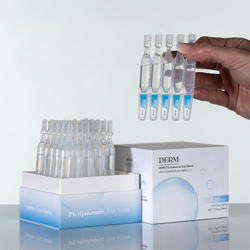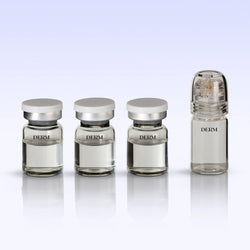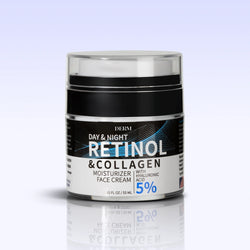Why Your Skin Gets Drier After 50 (And What to Do About It)

Written by Our Editorial Team
6 MINUTES READ
Have you noticed your skin feeling increasingly dry and tight lately?
If you're over 50, you're not alone.
While aging is a natural process, understanding why these changes happen – and more importantly, what you can do about them – can make a world of difference in how your skin looks and feels.

The Science Behind Aging Skin
As we age, our skin goes through several significant changes that contribute to dryness.
The most notable shift happens during and after menopause when estrogen levels decline dramatically.
This hormonal change triggers a decrease in natural oil production, leading to drier, less supple skin.
But that's not all.
Three key factors contribute to increased skin dryness after 50:
1. Decreased Oil Production Your sebaceous glands naturally slow down oil production as you age.
Think of these glands as your skin's built-in moisturizer – when they produce less oil, your skin loses its natural ability to keep itself hydrated.
2. Weakened Moisture Barrier Your skin's protective barrier becomes less effective at retaining moisture. Imagine your skin as a brick wall – over time, the "mortar" between the cells becomes less efficient at holding in hydration, leading to increased water loss.
3. Slower Cell Turnover The renewal process of skin cells slows significantly, leading to a buildup of dead skin cells that can make your skin feel rough and look dull. This slower turnover also means your skin has a harder time maintaining its moisture balance.
Signs Your Skin Needs More Hydration
- Tight feeling, especially after cleansing
- Visible fine lines becoming more pronounced
- Rough, flaky patches
- Skin that looks crepey or feels less plump
- Makeup that doesn't apply as smoothly as it used to
The Solution: Hydration from Within and Without
While drinking water is important for overall health, topical hydration becomes crucial after 50.
The key lies in using ingredients that can both attract and retain moisture in your skin.
Hyaluronic acid (HA) stands out as a particularly effective ingredient for mature skin.
This powerful molecule can hold up to 1000 times its weight in water, making it exceptional at bringing deep hydration to your skin.
However, the concentration matters significantly – while many products contain just 1-2% HA, research shows that a 3% concentration can provide superior hydration and better penetration into the skin's deeper layers.
Daily Skincare Tips for Dry Mature Skin
1. Be Gentle with Cleansing Use cream or oil-based cleansers that don't strip your skin's natural oils. Avoid hot water, which can further dry out your skin.
2. Layer Your Hydration Start with a hydrating serum (ideally containing 3% hyaluronic acid) on damp skin, followed by a moisturizer to seal in the benefits.
3. Protect Your Barrier Look for products with ingredients that support your skin's moisture barrier, such as ceramides and squalane.
4. Consider Your Environment Use a humidifier in dry weather and adjust your skincare routine seasonally as needed.
The Path to Plump, Hydrated Skin
While dry skin after 50 is common, it doesn't have to be your new normal.
By understanding these changes and using the right products with optimal concentrations of active ingredients, you can maintain soft, supple skin at any age.
Our DERM™ 3% Hyaluronic Acid Serum was specifically formulated with these needs in mind, delivering deep hydration where your skin needs it most.
With a powerful 3% concentration of hyaluronic acid, higher than most standard serums, it helps restore that plump, dewy look while strengthening your skin's moisture barrier.
Remember, it's never too late to start taking better care of your skin.
The key is choosing products that work with your skin's changing needs, not against them.





